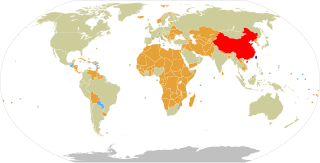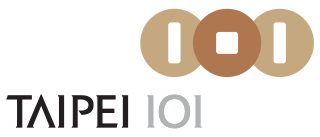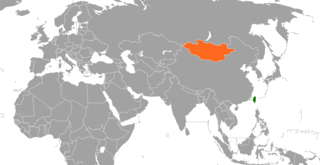| |||||
| Decades: | |||||
|---|---|---|---|---|---|
| See also: | Other events of 1912 History of Taiwan • Timeline • Years | ||||
Events from the year 1912 in Taiwan, Empire of Japan.
| |||||
| Decades: | |||||
|---|---|---|---|---|---|
| See also: | Other events of 1912 History of Taiwan • Timeline • Years | ||||
Events from the year 1912 in Taiwan, Empire of Japan.

Taiwan, officially the Republic of China (ROC), is a country in East Asia. The main island of Taiwan, also known as Formosa, lies between the East and South China Seas in the northwestern Pacific Ocean, with the People's Republic of China (PRC) to the northwest, Japan to the northeast, and the Philippines to the south. It has an area of 35,808 square kilometres, with mountain ranges dominating the eastern two-thirds and plains in the western third, where its highly urbanized population is concentrated. The combined territories under ROC control consist of 168 islands in total covering 36,193 square kilometres. The largest metropolitan area is formed by Taipei, New Taipei City, and Keelung. With around 23.9 million inhabitants, Taiwan is among the most densely populated countries.

Foreign relations of the Republic of China (ROC), more commonly known as Taiwan, are accomplished by efforts of the Ministry of Foreign Affairs of the Republic of China, a cabinet-level ministry of the Government of the Republic of China. As of January 2024, the ROC has formal diplomatic relations with 11 of the 193 United Nations member states and with the Holy See, which governs the Vatican City State. In addition to these relations, the ROC also maintains unofficial relations with 59 UN member states, one self-declared state (Somaliland), three territories (Guam, Hong Kong, and Macau), and the European Union via its representative offices and consulates. In 2021, the Government of the Republic of China had the 33rd largest diplomatic network in the world with 110 offices.
The political status of Taiwan or the Taiwan issue is an ongoing geopolitical dispute about Taiwan, currently controlled by the Republic of China (ROC), that arose in the mid-twentieth century. Originally based in mainland China before and during World War II, the ROC government retreated to Taiwan in 1949 after it was defeated by the Chinese Communist Party (CCP) during the Chinese Civil War and the subsequent establishment of the People's Republic of China (PRC). Since then, the effective jurisdiction of the ROC has been limited to Taiwan, Penghu, Kinmen, Matsu, and smaller islands.
One China is a phrase describing the relationship between the People's Republic of China (PRC) based on Mainland China, and the Republic of China (ROC) based on the Taiwan Area. "One China" asserts that there is only one de jure Chinese nation despite the de facto division between the two rival governments in the aftermath of the Chinese Civil War. The term may refer, in alphabetical order, to one of the following:

The Taiwan Strait is a 180-kilometer -wide strait separating the island of Taiwan and the Asian continent. The strait is part of the South China Sea and connects to the East China Sea to the north. The narrowest part is 130 km wide.

Hsinchu is a city located in northwestern Taiwan. It is the most populous city in Taiwan that is not a special municipality, with estimated 450,655 inhabitants. Hsinchu is a coastal city bordering the Taiwan Strait to the west, Hsinchu County to the north and east, and Miaoli County to the south. Hsinchu is nicknamed the Windy City for its strong northeastern monsoon during the autumn and winter seasons.

Taipei 101, formerly known as the Taipei World Financial Center, is a 508.0 m, 101 story skyscraper in Taipei, Taiwan. It is owned by Taipei Financial Center Corporation. The building was officially classified as the world's tallest from its opening on 31 December 2004. However, the Burj Khalifa surpassed Taipei 101 in 2010.The construction of Taipei 101 was a joint venture led by Kumagai Gumi, a Japanese construction company, in cooperation with Samsung C&T of South Korea. Upon completion, it became the world's first skyscraper to exceed a height of half a kilometer. As of 2023, Taipei 101 is the tallest building in Taiwan and the eleventh tallest building in the world.
"Chinese Taipei" is the term used in various international organizations and tournaments for groups or delegations representing the Republic of China (ROC), a country commonly known as Taiwan.

Taiwan Semiconductor Manufacturing Company Limited is a Taiwanese multinational semiconductor contract manufacturing and design company. It is the world's most valuable semiconductor company, the world's largest dedicated independent ("pure-play") semiconductor foundry, and Taiwan's largest company, with headquarters and main operations located in the Hsinchu Science Park in Hsinchu, Taiwan. Although the central government of Taiwan is the largest individual shareholder, the majority of TSMC is owned by foreign investors. In 2023, the company was ranked 44th in the Forbes Global 2000. Taiwan's exports of integrated circuits amounted to $184 billion in 2022, accounted for nearly 25 percent of Taiwan's GDP. TSMC constitutes about 30 percent of the Taiwan Stock Exchange's main index.

Cross-strait relations are the political and economic relations between China and Taiwan across the Taiwan Strait. Due to the existing controversy over the status of Taiwan and the Chinese legitimacy question, they are also not defined as diplomatic relations by either side.
Hon Hai Precision Industry Co., Ltd. (鴻海精密工業股份有限公司), doing business as Hon Hai Technology Group (鴻海科技集團) in Taiwan, Foxconn Technology Group (富士康科技集团) in Mainland China, and Foxconn (富士康) internationally, is a Taiwanese multinational electronics contract manufacturer established in 1974 with headquarters in Tucheng District, New Taipei City, Taiwan. In 2023, the company's annual revenue reached 6.16 trillion New Taiwan dollars and was ranked 20th in the 2023 Fortune Global 500. It is the world's largest contract manufacturer of electronics. While headquartered in Taiwan, the company earns the majority of its revenue from assets in China and is one of the largest employers worldwide. Terry Gou is the company founder and former chairman.

Tsai Ing-wen is a Taiwanese retired politician who served as the 7th president of the Republic of China (Taiwan) from 2016 to 2024, and was the first woman to hold that position. A member of the Democratic Progressive Party (DPP), she intermittently served as chair of the DPP from 2008 to 2012, 2014 to 2018, and 2020 to 2022.

Disney Channel was an pan-Asian pay television kids channel owned and operated by The Walt Disney Company Southeast Asia.

The Republic of China calendar, often shortened to the ROC calendar or the Minguo calendar, is a calendar used in Taiwan, Penghu, Kinmen, and Matsu. The calendar uses 1912, the year of the establishment of the Republic of China (ROC) in Nanjing, as the first year.

At its establishment in 1912, the Republic of China claimed to be the successor state to the entirety of the Qing empire, which included Outer Mongolia. The Republic of China did not recognize Mongolia's independence until 1945; the two never exchanged diplomats. When the Chinese Civil War ended in 1949, Mongolia recognized the People's Republic of China; the Republic of China continued to show Mongolia as part of its territory on official maps until 2002 when they recognized Mongolia as an independent country and established informal relations.

Lai Ching-te, also known as William Lai, is a Taiwanese politician and former physician who is currently serving as the 8th president of the Republic of China (Taiwan) since May 2024. He is the third member of the Democratic Progressive Party (DPP) to assume the office of president and the first whose predecessor was also a DPP member. He is also the third incumbent vice president to succeed to the presidency and the first to assume the office through election instead of immediate succession. He has also served as the chair of the DPP since 2023.
The COVID-19 pandemic in Taiwan was a part of the worldwide pandemic of coronavirus disease 2019 caused by severe acute respiratory syndrome coronavirus 2. As of 19 March 2023 in Taiwan, 10,231,343 are confirmed cases, including 18,775 deaths.

The COVID-19 pandemic in China is part of the worldwide pandemic of coronavirus disease 2019 (COVID-19) caused by severe acute respiratory syndrome coronavirus 2 (SARS-CoV-2). China was the first country to experience an outbreak of the disease, the first to impose drastic measures in response, and one of the first countries to bring the outbreak under control.